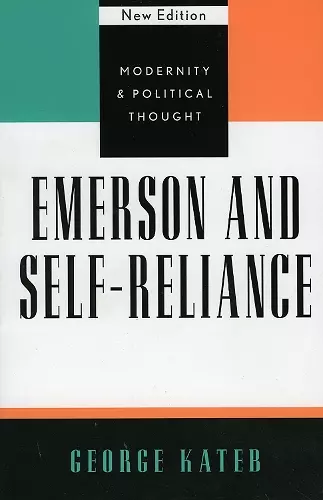Emerson and Self-Reliance
Format:Paperback
Publisher:Rowman & Littlefield
Published:3rd Apr '02
Currently unavailable, and unfortunately no date known when it will be back

Ralph Waldo Emerson was a great moral philosopher. One of his principle contributions is the theory of self-reliance, a view of democratic individuality. During much of his life, Emerson was considered a radical thinker, and his opposition to established religious opinion was scandalous. Emerson's deep commitment to individualism was at the root of his critique, and his articulation of individualism was constant, whether aimed against the group mind or against institutional constrictions. 'Nietzsche was Emerson's best reader,' and George Kateb provides an accessible reading of Emerson that is friendly to the interests of Nietzsche and to later Nietzscheans such as Weber, Heidegger, Arendt, and Foucault.
In this original treatment, which offers new insightson one of Emerson's central ideas as well as on his political theory,Kateb portrays an Emerson who is indispensable for thinking about America, as important as Jefferson and Lincoln. -- Eric Wilson * ESQ: A Journal of the American Renaissance *
There is no recent study that so convincingly shows that Emerson anticipates (and rivals) Nietzsche as a sustained practitioner of multiple perspectivism and that Emersonian self-reliance is therefore 'not one particular substantive or doctrinal principle like other ones.' In this and other ways, Kateb has deepened, and usefully complicated, our understanding of Emerson. -- Richard F. Teichgraber III * American Literature *
By emphasizing mental self-reliance Kateb reasserts Emerson the Transcendentalist and makes a compelling case for the political importance of this dimension of Emerson's thought. . . . For [Kateb] Emerson's construction of self-reliance serves as a vital, but problematic, model that political philosophers can situate as both the foundation and the consummation of a theory of democratic civil society. -- T. Gregory Garver * College English *
Emerson, in George Kateb's engagingly lucid and compelling account, is the American Shakespeare. Kateb justifies this bold claim by demonstrating the poetic amplitude, incisiveness, impersonality, and authority of Emerson's thought. With Emerson, to be sure, the dramatist's characters are replaced by ideas, and one idea—'self-reliance'—dominates all the rest. The chief imperative for citizens of a democracy, according to Kateb's Emerson, is a steady effort to think one's own thoughts and to think them through. This radical principle defines the philosophy of democratic individuality, a distinctively modern creed whose founding genius—Kateb persuasively reveals—was Ralph Waldo Emerson. -- Leo Marx, William R. Kenan, Jr. Professor Emeritus of American Cultural History, Massachusetts Institute of Technology
An important contribution. . . . Kateb] has an excellent discussion of how antagonism and contrast lie at the heart of Emerson's notion of identity. -- Sharon Cameron * Critical Inquiry *
ISBN: 9780742521452
Dimensions: 224mm x 153mm x 20mm
Weight: 381g
272 pages